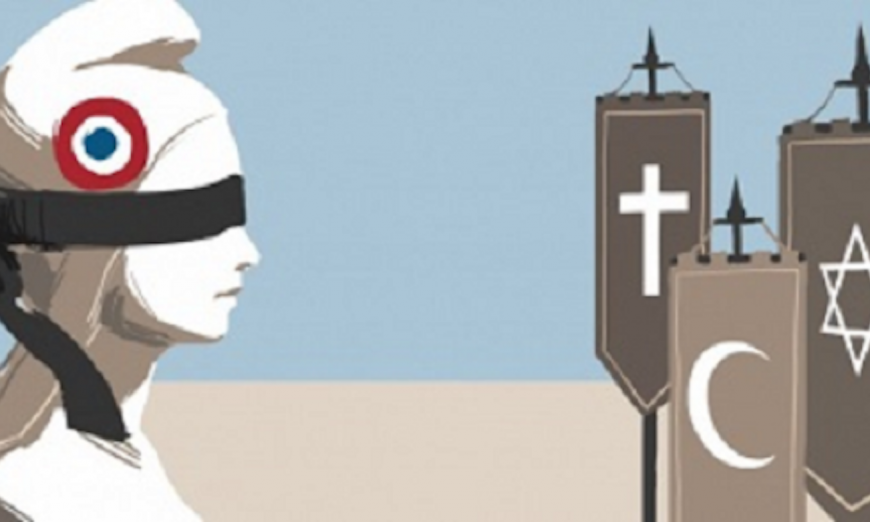Since its entry into force in 2004, the French law on secularity and conspicuous religious symbols has been perceived as a matter of concern by actors involved in dialogues over multiculturalism, human rights, freedom of religion and belief and the role of the state, especially in its duties to grant equal treatment to all citizens.
The law, signed by former French President Jacques Chirac on March 15, 2004, clearly states that any sort of symbol or attire openly displaying religious identities is forbidden within public schools, without targeting any particular religion or belief. Despite the clarity of the bill, it has been labeled as the headscarf ban in public schools and recognized as a concrete threat to the right to education for Muslim girls. Recently, several facts have contributed to rekindling the controversy over the legitimacy of the regulation, underlining once more the relevance of the subject covered by the law.
During the 2015 campaign for departmental elections, Nicolas Sarkozy, the leader of the former Union for a Popular Movement (UMP), now called the Republicans, proclaimed the need to introduce the same restrictive bylaw in public universities. At the end of April, a Muslim schoolgirl was prevented from attending classes because she was wearing what was deemed as a distinctive religious sign by the principal of the institute. It is important to note that the young lady was not banned for her headscarf, which she had removed prior to entering the course in accordance with the law, but for her long black skirt. The garb was construed as an expression of religious identity.
As reported by the Collective against Islamophobia in France, a national watchdog monitoring discriminations towards Muslims, a ministerial advisor working at the Observatoire de la Laïcité, a public body on secular issues, in a further interview declared that dressing in “a black long skirt does not infringe the law a priori.” Hence, the ban was the result of a broadening and erroneous interpretation of the ordinance.
The present examples are the result of a century-long clash within the French Republic between the state-secularism principle, established by the 1905 Separation of the Churches and State law, and freedom of religion granted by the 1789 Declaration of the Rights of Man and of the Citizen. In the early 20th century, the largest religious community suffering the effects of the 1905 law was the Christian one. Its place has now been taken by Islamic believers due to the presence in France of the largest Muslim community in Europe.
The 2004 law is comparable to the obligations that women are subjected to in some Muslim countries, where girls are forced to wear headscarves in order to attend education in public schools. In both cases, there are open violations of international human rights standards and a clear gender discrimination. According to international rules, states must avoid any coercion in the field of freedom of religion.
The importance of freedom of religion is clearly stated in almost all treaties adopted by the international community: Article 18 of the Universal Declaration of Human Rights (UDHR) unmistakably sets freedom of conscience, thought and religion as a universal right. The significance of this freedom is reiterated by the Declaration on Elimination of all Forms of Intolerance and Discrimination based on Religion or Belief and incorporated in the International Covenant on Civil and Political Rights (ICCPR). Freedom of thought, conscience and belief is protected by Article 9 of the European Convention on Human Rights (ECHR) as well; any possible discrimination endured on this ground, alongside those originating from racial, sexual or political intolerance, is forbidden by Article 14 of the ECHR and Article 1 of the ECHR’s Protocol No. 12.
Freedom of religion in education is also covered by the UN treaty and the EU convention: According to Article 26 of the UDHR, education performs a key role in promoting “understanding, tolerance and friendship among nations, racial and religious groups”. Protocol No. 1 of the ECHR provides the legal ground to enjoy the right to education (Article 2), stressing the state’s obligation to not deny this right due to one’s religion or belief.
However, although granted by domestic and international protection, freedom of religion in French public schools is perceived as a threat to secularism, the republic’s core value. Curbing the exercise of the claim does not constitute a violation because its limitation derives from higher values than individual ones: the preservation of the Laïcité as a republican principle of freedom, public order and rights and freedom of the others. The claim’s restriction was also confirmed by the European Court of Human Rights (ECtHR). The court also added that, as provided for by the French law and educational system, students who do not agree to obey the bylaw can attend governmental distant learning courses.
A decade after the entry into force, the law, while preserving at any cost the national secular identity, is generating several grounds of discriminations. The percentage of students belonging to different religions that willingly choose to attend distance learning courses is increasing as is the number of students frequenting religious-oriented schools. The law was enacted to avoid any form of discrimination among the next generations of citizens, to restrain the influence of religion on social relations and education. Instead of betting on the values of pluralism as an asset in contemporary societies, France is emphasizing the centrality of secularism, accepting the concrete risk to deal with further intolerance.
The ones who are experiencing the effects of the ban are women, the same ones who politicians were demagogically pretending to help. As a result, veiled girls that choose to follow the religious prescriptions are victims of a gender-religious discrimination. Centuries after the Declaration of the Rights of Man and of the Citizen, the republic is heading toward a Laïcité of exclusion, breaching the ideals of liberty, equality and fraternity.

